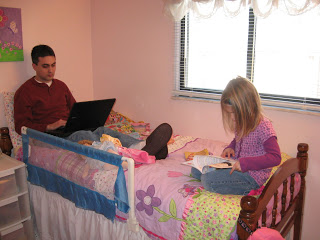 |
| Keeping my 5-year-old company while I work. |
Can women really have it all?
This question is a recent media obsession, but it has an old history. For what seems like forever, workers have struggled to juggle the balance between work and life. The advent of feminism and the career woman has in turn spawned the so-called “mommy wars,” the (at times mean-spirited) argument over what role(s) a woman can or should take in relation to family.
That has not stopped the press from trying to create anew story from this well-worn subject. Over the last year, the question has been frontpage fodder, seemingly for days at a time. On one end you have Anne-Marie Slaughter, who last summer penned a much talked-about piece in The Atlantic titled, “Why Women Still Can’t Have it All.” The 54-year-old left a prestigious job in the State Department and returned to work closer to home, in part, to raise her two teenage sons, one of whom had stopped turning in his homework and seemed to be tuning out of school.
Others have taken a very different angle. Enter Sheryl Sandberg, the 43-year-old mother of two and the COO of Facebook, and Marissa Mayer, the 37-year-old mom of an infant and the recently anointed CEO of Yahoo. Sandberg’s contributions to the news cycle come courtesy of her new book, Lean In: Women, Work, and the Will to Lead, which argues, among other things, that women need to pull themselves up and better assert themselves in improving their lives and careers in the workplace. Mayer’s accolades include claiming that having an infant was “way easier than everyone made it out to be” while simultaneously building a nursery by her office. (As an added bonus, news of Mayer’s nursery went mainstream not long after she banned telecommuting at Yahoo.)
Both Sandberg and, to a lesser extent, Mayer have both set themselves up as role models for working women who are also trying to “have it all” by embracing motherhood and family. To be fair, their lives bear little resemblance to the average working mother. Look no further than their net worth: Sandberg, thanks to her Facebook stock, is a billionaire, while Mayer is worth around $300 million. These are supremely wealthy moms (with supportive husbands) who could afford a fleet of child care workers and night nurses. Most working mothers I know are in no position to make demands of their employer on behalf of being more mother-friendly, and fewer still would call raising a baby while working more than full time “easy.” Even Slaughter did not abandon the workplace entirely, as her version of “pulling back” consisted of returning to Princeton and raising her sons alongside her very supportive husband, also a university professor.
Of course, for many mothers, the question of work versus life is a topic that many parents don’t have the luxury to entertain. Anne-Marie Slaughter conceded the disconnect between the lofty ideals of affluent families and the realities of many mothers when she said:
Millions of other working womenface much more difficult life circumstances. Some are single mothers; many struggle to find any job; others support husbands who cannot find jobs. Many cope with a work life in which good day care is either unavailable or very expensive; school schedules do not match work schedules; and schools themselves are failing to educate their children. Many of these women are worrying not about having it all, but rather about holding on to what they do have.
Adds New York Magazine writer Lisa Miller:
What if a woman isn’t earning Facebook money but the salary of a social worker? Or what if her husband works 80 hours a week, and her kid is acting out at school, and she’s sick of the perpetual disarray in the closets and the endless battles over who’s going to buy the milk and oversee the homework? Maybe most important, what if a woman doesn’t have Sandberg-Slaughter-Mayer-level ambition but a more modest amount that neither drives nor defines her?
More on that last point later on. With regard to the financial considerations, I am surprised at how many middle-class, and even working-class, couples I know who do have some degree of choice on the subject of work and life. For example, I can think of dozens of examples of middle-income people I know who choose to work in specific places because of factors such as greater career advancement, pay that allows them to live in a larger home, or the chance to enroll their children in a private school or an elite sport. Whether or not those are the right choices are intensely personal decisions that each family has to make based on individual circumstances, including the temperament of the parents, the ages of the children, financial realities, and many other factors.
 |
| Our family, striving to maintain work-life balance. |
And I use the terms parentsand family purposefully, too, because I think men are just as important to this conversation as women. In fact, I’m baffled by how infrequently the topic of juggling work and family comes up with regard to men. There is much discussion about work-life balance for mothers but not nearly as much for fathers, whose own careers can leave them far removed from their families. This is tragic, because there is a mountain of evidence that indicates that present, involved fathers can have a profound, lifelong impact on their children. At least where two parents are involved, I think it is critical that work-life discussions involve not just the mother but the father as well.
That is a major reason why I, as a man, felt like this was a topic worth talking about on a blog oriented toward women. When talking about work and life in a home that has a husband and wife, both of them – not just the wife – need to carefully contemplate the balancing act between work and family.
So, then, “can any *parent* have it all?”
The definition of “all” will likely vary widely from person to person, but for argument’s sake, let’s take the media’s bait and define it as both a successful, high-paying, executive-level career and a successful life as a parent.
If that is the definition, the answer is, probably to no one’s surprise … no. The reason is rooted in simple arithmetic. DeLoreans or Time-Turners notwithstanding, humans have 24 hours in a day to have it all. It’s a finite, limited amount of time. For the working parent, the hours lost to the likes of sleep, preparation for work, commuting, dropping off children at child care, work itself, picking up children, commuting again, shopping for groceries, cooking dinner, and taking care of Heaven-knows-what-else can whittle away time so sharply that what’s left can be precious little. Add to that a tired parent and turning that sliver of time into quality time with kids can be even more difficult, assuming there’s any left at all. And that doesn’t even begin to scratch the surface of quality time with husbands and wives. Is there really a way to have it all? Is there even enough time?
High-profile women who proclaim to have it all
Now, scale that up for the successful corporate executive. People in middle to upper management routinely work 50+
hours a week, and the people at the top mentioned at the start of this post can work even more to try to have it all. Although Sheryl Sandberg says that she has dinner with her kids, I would bet that her work resumes shortly thereafter and her total time orchestrating Facebook’s corporate side totals a lot more hours than the ones she spends in the office. Is it unrealistic to think she works 14-16 hours a day, or even more? If so, I can’t fathom that her evenings involve any substantial quality time with her husband or her kids, not when the company of a billion users needs her attention and she’s got a new book to market.
Mayer, likewise, has gone on record saying, “it’s God, family, and Yahoo – in that order,” but somehow I suspect her actual hours allocated in those pursuits paints a different picture. Indeed, a recent author interviewing her for a book found that in her Google days she worked from 9 a.m. to 8 p.m. every day, followed by a workout and e-mail work until 11 p.m. And she wasn’t the head of Google as she is now with Yahoo.
There’s a name for this dilemma. In economics, it’s called opportunity cost, which in plain speak is what we’re giving up to have what we have now. Each hour we devote to work or to family is lost to the other. In strictly that context, we can never have it all. If, for example, I choose not to work on my career for the three hours I spend at a kid’s soccer game, that’s three hours I’ve lost to my career that may hurt my chances down the road of scoring that big promotion. That may be a worthy investment of time for me, but it doesn’t change the fact that I’ve lost that time for work.
So when the media talks mythically about trying to “have it all,” we invariably run against the simple but inescapable truth that there may not be enough hours in the day to be a.) Executive of the Year (or even Employee of the Year) and b.) Spouse and Parent of the Year, all at the same time. Something has to give, and the brutal reality is that each time we sacrifice one, we chip away a chance at greatness in the other. That’s life. We can’t have it all at one time.
For all the premium our society places on career success as the preferred choice, there seems to me a certain amount of bravery in challenging those assumptions. For several years now I have known a man, a single father, who has been steadily climbing the ladder in the public sector. He now works as an assistant superintendent in a large suburban school district, a job that commands a six-figure income but also demands long hours and many required evening meetings. This man is also a single father to two sons who are in high school. Recently, the man made waves in his district when he told the district’s Board of Education that he was interested in a different position in the district, a director of one of the district’s programs. The reason he gave to the Board: he wanted to spend more time with his sons as they moved through high school, and the director job had fewer required meetings.
For this man, who was considered a rising star, it might be considered a career downgrade. Perhaps it will hurt his career. Perhaps it will not. But I have to believe that it will help his sons.
And that decision is truly a road less traveled.
Let’s connect on social media too:
Mumbling Mommy on Facebook
Mumbling Mommy on Twitter
Mumbling Mommy on Pinterest
Category: Family Free TimeTags: Anne-Marie Slaughter









